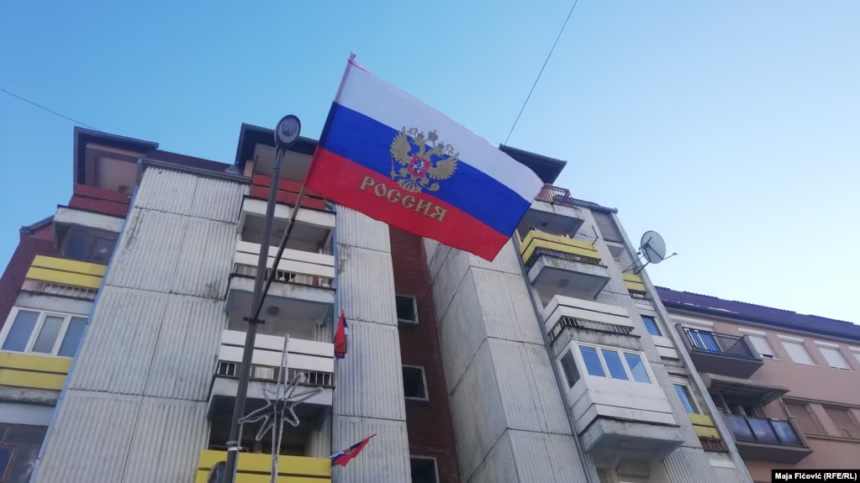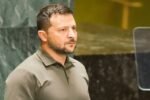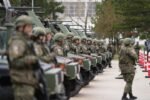Six years ago this November, then-President of Kosovo, Hashim Thaçi, met Russian President Vladimir Putin at the Paris Peace Forum.
It was their first-ever meeting, and according to a tweet from Thaçi at the time, their discussions focused on normalizing relations between Kosovo and Serbia. Thaçi quoted Putin as saying that Russia would support a peace agreement between the two countries.
Russia, a close ally of Serbia, does not recognize Kosovo’s independence, declared in 2008. Putin uses Kosovo’s independence and NATO’s intervention in former Yugoslavia as “precedents” to justify his actions in Ukraine.
When launching a full-scale invasion of Ukraine on February 24, 2022, Putin claimed that the “special military operation” followed many other precedents.
“Initially, a bloody military operation was conducted against Belgrade without UN Security Council approval, using fighter jets and missiles in the heart of Europe. Peaceful cities and critical infrastructure were bombed for weeks,” Putin said.
Such comparisons, deemed baseless by the West, have been made repeatedly by Putin, particularly since 2014. When annexing Crimea a decade ago, Putin likened it to Kosovo’s independence from Serbia.
For years, Russia has also engaged in hybrid warfare against Kosovo, spreading false information. Through its media and institutions, it manipulated narratives to serve its interests, targeting predominantly Serb-populated areas.
In June 2022, for instance, the Russian Embassy in Albania published a list claiming that 156 mercenaries from Kosovo had joined Ukraine’s fight against Russia. Kosovo authorities dismissed the numbers as propaganda, as did researchers of Russian disinformation.
According to a report by the Kosovo Center for Security Studies (KCSS) published this month, these efforts to portray Kosovo as unstable continue today.
The report analyzed over 34,000 words extracted from more than 100 official statements, speeches, interviews, and texts from Russia’s Ministry of Foreign Affairs.
The narratives primarily depict Kosovo as a failed state, claiming Western intervention served selfish interests, and alleging that the West uses Kosovo to expand influence and isolate Serbia.
The report also highlights that Russia itself undermines the normalization process between Kosovo and Serbia, as such normalization would significantly weaken its influence in Serbia and the Western Balkans.
Lulzim Peci of the Institute for Policy Development in Pristina argues that Russia does not want the dialogue to conclude according to Western plans. He cautions that Kosovo should not expect a shift in Russia’s stance anytime soon.
“Russia aims to prolong tensions by supporting Serbia, despite Serbia supplying weapons to Ukraine,” Peci said.
He added that Russia’s dependence on Serbia highlights its need for unresolved Kosovo-Serbia relations to hinder the region’s EU integration.
For Ivana Stradner, a researcher at the Washington-based Foundation for Defense of Democracies, Russia is exploiting Serbia for its goals. She warns that Russia’s hybrid warfare in Kosovo—spreading disinformation and polarizing society along ethnic, social, and religious lines—is “extremely dangerous.”
“Information is a weapon. Remember what happened in Ukraine in 2014! Russia achieved all its objectives there without firing a bullet,” Stradner said.
Kosovo authorities, including President Vjosa Osmani and Prime Minister Albin Kurti, frequently warn that Russia, “through its satellite Serbia,” seeks to destabilize Kosovo.
Last month, during a visit to Pristina, European Commission President Ursula von der Leyen condemned Russia’s “hybrid war,” saying it aims to destabilize democracies in the Western Balkans, including Kosovo.
Disinformation poses a severe threat to democracy, politics, society, and the economy across the EU.
In response, Kosovo has taken measures, including banning Russian media and online platforms that fabricate false information about Kosovo.
However, Peci argues that these steps are insufficient. He believes Kosovo’s voice remains unheard in many parts of the world, from Asia to Africa.
He suggests Kosovo establish a unit combining efforts from the Ministry of Foreign Affairs to the Intelligence Agency to address Russian misinformation effectively.
“This is achievable, but no concrete steps have been taken so far. Reactive measures are inadequate, indicating Kosovo lacks a coherent policy and strategy against Russian disinformation both regionally and globally,” Peci stated.
With political will and clear ideas, Peci believes Kosovo could develop solid capacities within six months to a year.
Radio Free Europe reached out to the Kosovo government regarding further measures against Russian disinformation but received no response.
Stradner also emphasized Kosovo’s lack of effort: “We wouldn’t be having this conversation if Kosovo or its allies were doing a fantastic job. Russian propaganda is pervasive and growing. I can’t keep up with how quickly Telegram accounts appear.”
She highlighted the urgency of addressing this problem as the U.S. prepares for a new administration under President-elect Donald Trump.
Stradner anticipates the next administration will adopt a transactional “buy-and-sell” policy in the Western Balkans.
“Economic focus alone won’t solve everything. If the new administration genuinely wants to prevent further escalation, it must pay closer attention to the region and avoid falling into Moscow and Belgrade’s traps,” she said.
This week, Serbian President Aleksandar Vučić confirmed his upcoming visit to Moscow in May next year at Putin’s invitation. Vučić described it as a “great honor” to attend celebrations marking the 80th anniversary of World War II victory.
It will be his first visit to Moscow since Russia launched its full-scale invasion of Ukraine nearly three years ago.
Despite the war, Serbia never joined Western sanctions against Russia and continued its economic and military cooperation with Moscow.
Russia has a liaison office in Kosovo, which Radio Free Europe contacted for details on its activities but received no reply.
According to a survey by the International Republican Institute (IRI) this year, Kosovars see Russia as the main threat to their country after Serbia.
Former President Thaçi may have hoped that Putin wanted peace, but it appears Putin has his version of peace—one rooted in tension and exploitation.
Experts stress that Kosovo must proactively counter Russian influence and strengthen ties with Western allies.







